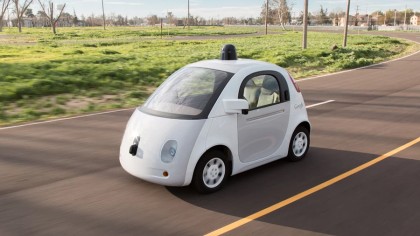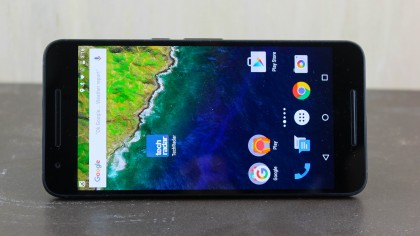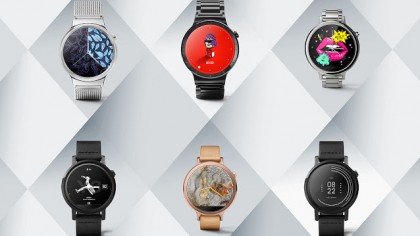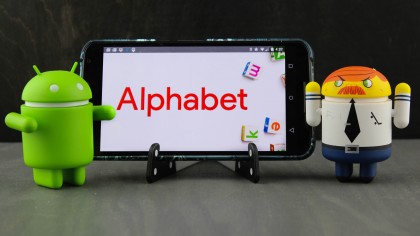The highs and lows for Google in 2015
From Alphabet to ad blocking

Sign up for breaking news, reviews, opinion, top tech deals, and more.
You are now subscribed
Your newsletter sign-up was successful
It's hard to believe that Google is just seventeen: it runs through our lives like a word through a stick of rock, and for many of us its products are as essential as electricity. As a firm with big ideas and big budgets to back them up it's capable of incredible things, but like any big corporation it's also capable of making the odd mess too.
Here are our picks of Google's highs and lows in 2015.
High: Android
Android has been an extraordinary success for Google. What began life as a fairly uninspiring mobile OS has become the world's favourite mobile operating system, and while there have been a few bumps along the way - while market share in the US is rising, it's falling slightly in France, Germany, Italy, Spain and the UK - and it's driven down the cost of smartphones quite dramatically. More smartphones means more people using Google services and seeing Google ads, of course.

Low: Car wars
It's easy to chuckle at Google's self-driving car being pulled over for driving too slowly, but Google's autonomous vehicle project has to deal with another, much more serious legal issue: Californian regulations that might mandate a fully trained and qualified human driver in every self-driving car.
If you're thinking that could stall the progress of self-driving vehicles in California at least, you're probably right. Google, it's safe to say, isn't over the moon.
High: Nexus 6P
The Nexus programme has been a bit hit and miss for Google in the past, with some supposed Android flagships looking a little uninspired. You can't say that about the Nexus 6P, which is an enormous improvement over its predecessor and arguably the best Android device around.
As a showcase for the latest version of Android, Android Marshmallow, it does its job very well indeed - and it's priced to sell, too.
Sign up for breaking news, reviews, opinion, top tech deals, and more.

Low: Adblocking
Apple's support for ad-blocking doesn't sound like a big deal, but when your business still largely depends on advertising, everybody's moving to mobile, and the biggest mobile spenders are all iOS users, the dawn of iOS ad-blocking is clearly an existential threat to Google.
For now it's more of a potential threat than an actual one as the number of blocking users is still relatively low, but if blocking takes off then Google has a big problem.
High: Android Wear
Like the original Android, Google's version for wearables got off to a bit of a shaky start - and like the original Android, Android Wear has evolved very quickly.
Where early Android Wear devices looked more like something you'd have to wear in prison than something you'd willingly wear on your wrist, the current generation includes some very pretty designs and lots of customisation to make your Android Wear device unique to you. The wearable sector is still in its very early stages, but Android Wear has learned to walk very quickly.

Low: Android OEMs
It's starting to look a lot like Windows out there: OEMs battling one another with barely differentiated products and profit margins so thin they'd be better off opening discount stores. The horrible truth about making Android devices is that if you aren't Samsung, you probably aren't making much money - and that's a problem, because it suggests that Android isn't cracking the higher end market. Meanwhile Apple is raking in nine-tenths of the entire smartphone industry's profits.
High: Alphabet
Corporate reorganisations don't usually make our lists of hits and misses, or even our lists of things that are quite interesting, but Alphabet is very different. As Michelle Fitzsimmons explains, "As Alphabet, which Google Co-founder Larry Page described as 'mostly a collection of companies,' the new-look Google can focus on what it wants to do best (search, ads, apps, YouTube and Android, specifically) and every other company not a part of this (Calico, Google Fiber, Google X, Google Ventures, Google Capital, and Nest) can thrive as its own entity with generally its own distinct leadership."
That will be hugely important for Google's future.

Low: Europe
How worried is Google about the European Union's ongoing anti-trust investigations? It's worried enough to spend $3.5 million to get US congressfolk to lobby the EU on its behalf. That sounds like a lot of money, but if Google is found guilty it could lose $6 billion.
And it's just one of multiple EU investigations, one of which is looking at Google's Android business. Remember the damage the EU dealt to Microsoft? Google does.
High: Quantum Computing
Imagine a computer so powerful it could crack any encryption in the blink of an eye. Google's working on it, and this month it announced in a research paper that it had actually got the technology to work.
The goal is to make machine learning and artificial intelligence much more powerful. As Google engineering VP John Giannandrea puts it: "We've already encountered problems in the course of our products impractical to solve with existing computers, and we have a lot of computers."

Low: ChromeOS
Is ChromeOS on the chopping block? Despite powering a lot of really nifty Chromebooks and generating decent market share, especially in education, the arrival of the Pixel C tablet/hybrid running Android rather than ChromeOS suggests so.
According to a report earlier this year, Google doesn't want to make and support multiple mobile platforms and it therefore planning to kill ChromeOS and merging it with Android to form a new computing Android OS - to be revealed in 2017. However, Google has since denied this.

Contributor
Writer, broadcaster, musician and kitchen gadget obsessive Carrie Marshall has been writing about tech since 1998, contributing sage advice and odd opinions to all kinds of magazines and websites as well as writing more than twenty books. Her latest, a love letter to music titled Small Town Joy, is on sale now. She is the singer in spectacularly obscure Glaswegian rock band Unquiet Mind.